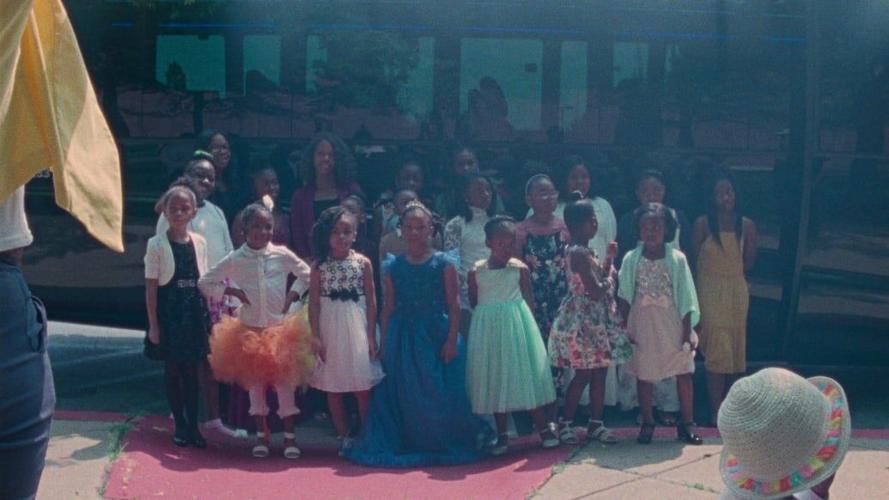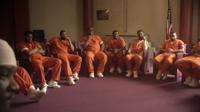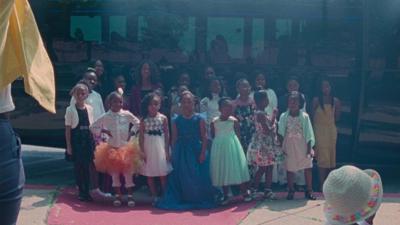Girls For A Change is a nonprofit organization that seeks to empower girls and young women and encourage them into social justice projects. Camp Diva Leadership Academy is one of its facets, which focuses on Black girls building sisterhood and self-esteem outside the classroom. In 2008, that academy developed what it calls "Date With Dad Weekend," which is a program meant to strengthen the bond between Black girls and the men who created them. The weekend includes a formal dance party that the girls attend with their fathers. Unfortunately, for some, they can't invite their dads to the dance because their fathers are in prison. At a meeting in Richmond, Virginia, one of the Black girls in Camp Diva simply asked, "What if we had the dance in jail?" This prompted the organization to write to Richmond's sheriff and petition for the dance to be held within their local, correctional facility.
This documentary was directed by Angela Patton, the CEO of Girls For A Change, and Natalie Rae who has done several music videos but this is her feature debut. Patton with Rae's help crafts this film, which follows this "Date With Dad" program, as it expanded to a prison in Washington, DC. The doc starts with the fact that the fathers have to prepare for the event with 10 weeks of classes. The classes aren't instructional as they are more group therapy where the guys sit in a semi-circle and discuss or share their feelings and what they expect from this experience. The film goes into the actual event and finally it gives us the aftermath over the course of three years.

What's incredible is the intimacy and the access that the filmmakers had. This is not just in regards to the men in prison but also to their children. I can't imagine it was easy getting access to the inside of a men's prison. At the same time, it probably wasn't easy convincing their families to allow film cameras inside their homes, especially when it came to documenting young children, the youngest being a 5-year-old. Patton and Rae's camera not only follows this little girl but the camera is seemingly so up close to her face. The camera in fact feels so intimately close with a couple of scenes depicting the children in bed, often with their mothers.
This film basically profiles four children, participating in this program. Aubrey is five. Santana is ten. Ja'Ana is twelve and Raziah is the older teenager. Each one is representative of four different perspectives and reactions to this whole situation. Each represents four different relationships. Aubrey is a very smart and very verbal girl who is great at math. She's basically counting down the days till her father gets out of prison. Santana is very angry and a lot of that anger is fueled by her father's incarceration. Raziah is very depressed about her father's absence, which manifests in very terrifying ways. As the film progresses though, we see how those relationships progress, how some get better and how some get worse.

The brutal honesty of those progressions is probably what makes this film as powerful as it ultimately is. However, there is an emotionally wrenching section and that is the depiction of the dance itself. It's telegraphed that the event will be very emotional, but when it happens, it does hit with a huge wallop. These are families that have been separated for a long time. These are men who haven't seen or touched their children in years. Their reunion is such a raw form of love and yearning that the feelings expressed penetrate the screen. The tears do in fact spill over and transfer themselves through the camera lens. This film is a weepy for sure.
It might seem overly sentimental in that moment. But, the aftermath that gets depicted moves the film away from that sentimentality by depicting the harsh and rather matter-of-fact results. Again, some are positive. Some aren't. Yet, the film is certainly a testament of fatherhood and how impactful a father's presence or lack thereof can have on a family and particularly upon that of a girl. It's also a testament of how and why a program such as this can affect the recidivism of convicted men. It's easy to throw out a statistic or a number, but this film shows you why such a statistic is what it is, on a visceral, human level.

Rated PG-13 for themes and language.
Running Time: 1 hr. and 48 mins.
Available on Netflix.









